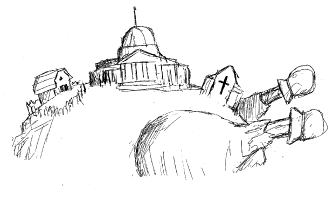![]()
![[ OPINIONS ]](/images/fall97/opinionsf97.gif)
![]()
By Bradford James Senning
Arizona Daily Wildcat November 26, 1997
Thanksgiving: A Reverie
![[Picture]](04_2_i.gif)
Bradford James Senning |
I adopt my Pilgrim name for this special Thanksgiving edition of my biweekly
column. I am descended from John Alden, who with Priscilla Mullins and Miles
Standish comprises one-third of that Pilgrim love-triangle made infamous
by another Alden descendent, Henry Wadsworth Longfellow. The tryst ended
up working in John Alden's favor, so Longfellow and I are living thank yous
to this providence.
My parents, recognizing the historical significance of our Pilgrim roots, gave my siblings and me Pilgrim names, mine being an inversion of Plymouth colony resident's James Bradford. All of us wear our Pilgrim heritage by name alone: none has thought to r esearch the family history as heartily as we eat our turkey.
So I thought I'd take some time to research the single thread by which we yearly cling to our Puritan founders: Thanksgiving.
Of course we know, besides hanging witches and pillorying drunkards, the Pilgrims went to the edge of the earth for their Christian faith. They sought sanctuary in this plush, new land, exiling themselves here to escape religious persecution.
Nowadays, it's hard to comprehend the religious obsession these Pilgrims felt, which caused them to look upon natural phenomena as if they were signals from God just as Hamlet saw providence in the fall of a sparrow.
Take the first winter of the Massachusetts Bay Colony, which was so spiteful it killed nearly half of the colony's inhabitants. Those who survived were able to plant crops and reap the bounty, thereby believing they were endowed with life and victuals by the providence of God. The Governor of the colony, William Bradford, keen on maintaining his favor with God, proclaimed a three-day festival of thanksgiving.
Our Thanksgiving was founded not upon the wings of a turkey, but upon the Puritan ideal of salvation. In the 17th century "Prayer Book," the idea of thanksgiving originates in religious submission and enthusiastic prayer: "O come, let us sing unto the Lor d: let us heartily rejoice in the strength of our salvation. Let us come before His presence with thanksgiving: and shew ourselves glad in Him with psalms."
In 1808, on the occasion of Congress' abolition of the slave trade, Absalom Jones also preached of gratitude in thanksgiving to God. Juxtaposing the plight of the Israelites, slaves in ancient Egypt, with his own people's enslavement, he finds providence in new freedom. But in order to appreciate liberty we must also "... remember the rock whence we were hewn, and the pit whence we were digged ..." That's a grace not to be desired, over a meal more political than religious.
But politics is as much a part of Thanksgiving as oyster stuffing.
The first true Thanksgiving in this country was the result of a 1621 government notice. Colonies other than Massachusetts Bay also adopted the Thanksgiving celebration, usually by virtue of a governor's proclamation or a codicil written into a colony's ch arter.
It wasn't until 1789, during George Washington's presidency, that a date was generally promoted for Thanksgiving: Nov. 26. But the Episcopalian church had proclaimed Thanksgiving to be the first Thursday in November. And different states exercised their s overeignty by choosing different dates.
Then, in 1863, Abraham Lincoln proclaimed a National Thanksgiving Day to be held each year on the last Thursday in November. This date lasted 75 years, when economic enthusiast Franklin Delano Roosevelt moved it a week earlier to lengthen the shopping per iod before Christmas. Thus, 1939 marks the year business concerns blurred the religious, the agricultural and much of the political history of Thanksgiving. Roosevelt made a monument of this holiday, bearing by the name of Thanksgiving only a remote histo rical connection to the past.

But traditions have a way of becoming redundant to the point where we can no longer see the history behind them. So we spice up the tradition by adding new traditions or personalizing our take on the tradition. Historically, Thanksgiving has been celebrat ed on different dates and in different ways. It is a tradition which begs for change, which allows for various side-dishes, different methods of prayer, and cousins who prefer to practice armpit farts than listen to the hoary tales of Grandpa's first Than ksgiving. By its nature, it is a personalized holiday. All of us are thankful for different things. So we expect our personal tastes to commend themselves over the rigidity of tradition.
I met John Alden once when I was a kid. There's a place called the "Plymouth Plantation" near Plymouth, Mass., where actors play the parts of historical Pilgrim figures in a setting manufactured to resemble the Plymouth colony. I found John Alden stooped over a palette on the dirt floor of his cabin. He was hewing wood to build a bed, in obvious reverie over Priscilla Mullins who he'd yet to marry in this theater of Plymouth lore. What to ask him, my great-great-great-great-great-great-great-great-great-g reat-great-great grandfather, or facsimile thereof?... What do you say that's worthy of your ancestors? What hold was on Odysseus' tongue when he chanced to meet the dead Achilles? What sound clucked in Hamlet's mouth upon meeting his dead father, himself ? "John," I said, piously tuning my voice, "what do you think of Longfellow?" He let peal some laughter then wimpled his brow, "I like the part," he said, "where John and Priscilla come together."
How nice it is that my ancestor and I, on Thanksgiving and each day of the year, can be thankful for the same thing.
Bradford James Senning is a senior majoring in American literature and creative writing.



